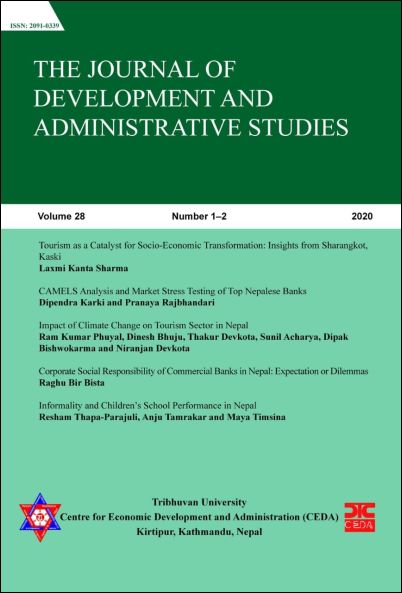Impact of Climate Change on Tourism Sector in Nepal
DOI:
https://doi.org/10.3126/jodas.v28i1-2.64380Keywords:
Tourism GDP, Climate Change Induced Disaster, Tourism Loss and Damages, Tourism Demand Function, Economic Impact AnalysisAbstract
Climatic variations might have a negative impact on the activities and services provided by the tourism industry. However, this idea has not yet been investigated in the context of Nepal. This study examines the monetary impact that climate change has had and will continue to have on Nepal's tourism industry and makes projections on such impacts. The economic impact assessment of climate change on Nepal's tourism sector is the first study of its sort to be conducted anywhere in the nation. This research is predicated on a conceptual model that was established on the theoretical foundation, a mathematical model that generated the tourism demand function, and an economic effect analysis that was performed on the tourism sector using secondary data. The findings of the study's analysis have been broken down into three distinct sections: a trend analysis of tourism and its contribution; regression results based on the models that have been established; and a projection of GDP for the years 2020-2030 and 2100. It is abundantly clear from the trend analysis, the analysis of loss and damage from climate-induced hazards, the econometric modeling for tourism function analysis and correlation on tourism GDP, and other research that the tourism sector is extremely vulnerable to the effects of climate change and that it will have significant repercussions. The projection of tourism's contribution to the national GDP shows that this sector has the potential to make a larger contribution, provided that the conditions that could prevent this from happening do not change. On the other hand, the rising trend of climatic factors and climate-induced dangers could potentially lead to a greater overall loss and damage in the tourism industry. As a result, it will have an immediate bearing on the contribution made to the national economy.
Downloads
Downloads
Published
How to Cite
Issue
Section
License
The copyright of the accepted articles is reserved by the Centre for Economic Development and Administration (CEDA), Tribhuvan University (TU). No part of the article published in this journal should be reproduced except provided by the law currently in force without the written consent of the centre.




